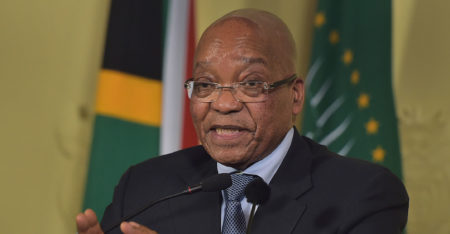
South Africa’s ruling party said the nation’s presidency should have stronger powers to drive government policy and allocate budget resources.
“The presidency must be strengthened as the strategic centre of power in the state,” the ANC said in a discussion document released Sunday before a 30 June to 5 July policy conference in Johannesburg. It must drive the “planning and policy, resource allocation and enforcement”, the party said.
The release of the document comes in the wake of a feud between President Jacob Zuma and finance minister Pravin Gordhan for control of the nation’s finances. While Zuma has spearheaded a drive for “radical economic transformation” to give the country’s black majority a bigger stake in the economy, Gordhan has called for more inclusive growth and spending curbs in a bid to protect the nation’s investment-grade credit rating and attract more foreign investment.
Zuma, who’s due to step down as party leader in December and as South Africa’s president in 2019, has been embroiled in a series of scandals, including a constitutional court finding that he broke his oath of office by refusing to repay taxpayer money spent on his private home.
“The ANC’s proposal is counter-intuitive to the current legal narrative that says Zuma has too much power,” said Theo Venter, a political analyst at North West University’s business school in Potchefstroom, west of Johannesburg. “The party appears intent on breaking the autonomy of the national treasury.”
The ANC dominates South African politics, having won more than 60% of the vote in every national election since it took power in 1994. It suffered its worst-ever electoral performance in a municipal vote in August, amid mounting discontent over high levels of poverty, unemployment and corruption.
While the ANC echoed Zuma’s call for greater focus on “radical economic and social transformation of our country” to ensure its wealth is more evenly distributed, it also said the party must act urgently to restore its moral character to win back public trust.
“The ANC’s own internal challenges, such as social distance between leaders and members, widespread corruption, poor performance in government and abuse of organisational processes for personal gain, will contribute to the ANC’s demise if left unattended,” the party said.
The ANC document also suggested the state should pay fair compensation for land it acquires for distribution to the poor, contradicting Zuma’s suggestion that the constitution should be changed to allow for free expropriation.
The government’s land redistribution policy needs to be more clearly articulated and it should spell out what constitutes just and equitable compensation for real estate, the party said.
The ANC’s other proposals include:
- Establishing a party electoral commission to prevent the manipulation of internal voting processes;
- Automating party recruitment and management;
- Increasing vocational training and apprenticeship programs for young people;
- Boosting support for more labour-intensive infrastructure programme;
- Greater help for black entrepreneurs to start small businesses;
- Enhanced regulation of private businesses to prevent price fixing, unfair competition and unfair labour practices;
- Improving the quality of health, education and public transportation;
- Establishing an integrity and ethics management office for the government and state companies.
The proposals still need to be adopted by the ANC and probably won’t be implemented during Zuma’s tenure as head of the party, said Abdul Waheed Patel, MD of Cape Town-based Ethicore Political Consulting.
“Changing how the government is run is quite a lengthy and arduous process,” he said by phone. “The ANC’s proposals are unlikely to affect the short to medium term, but may create uncertainty in the current period. There is a move towards a more centralised approach. It’s very early to tell how this is going to work out.” — (c) 2017 Bloomberg LP




